How Desi Americans Are Using Their Own ‘Bhasha’ To Woo Voters

Lakshmi Bhaduri proudly displayed a large Biden-Harris sign in her front yard in Wisconsin. By morning, it was gone! She lives in a strong Republican, moneyed, and predominantly Caucasian suburb, where Democratic supporters are rare. Not to risk losing another one, Lakshmi brings in the yard sign every night. In spite of being in a minority in Wisconsin – Democrat and Indian American – Lakshmi created the Wisconsin chapter of ‘TheySeeBlue’, a non-profit that aims to increase voter turnout among Democratic South Asian Americans.

Her team of volunteers are leveraging personal relationships and a shared desi identity, when making calls and texting voters. Lakshmi believes, “South Asians contacting South Asian voters, will have a significant impact on the outcome of the US Presidential election.”
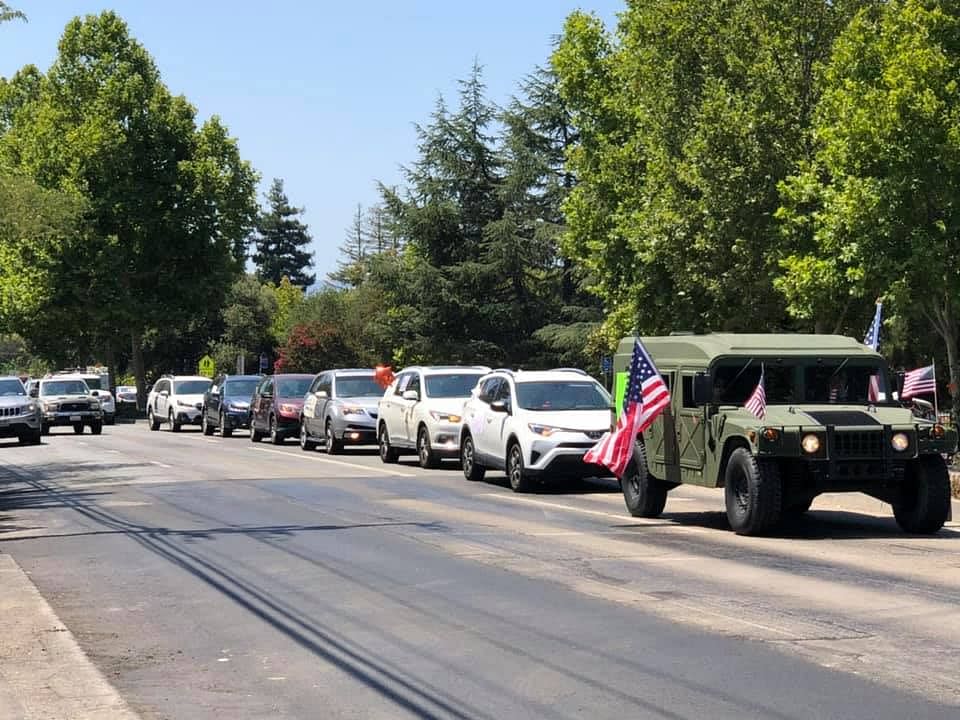
Also Read: Why More Indian Americans Want To Be In US Government
‘South Asian Vote Crucial To Potential Biden-Harris Win’
The Indian American community has seen more political attention and participation in 2020 than any prior US elections. Desis, who had never participated in politics, have now been galvanised. Shocked by Hillary’s 2016 defeat, an idea of courageous resistance brimmed in a conversation between friends at a Silicon Valley backyard.
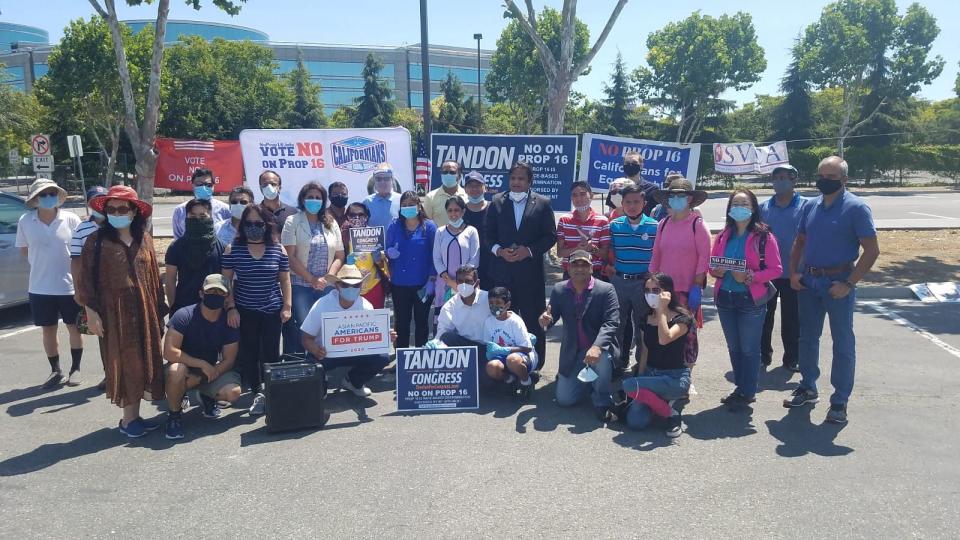
Two years of a divisive Trump presidency led them to form ‘TheySeeBlue’. Co-founder Rajiv Bhateja has no prior political experience: “I am an accidental activist. We haven’t done it before, but felt compelled, which is true of a lot of our volunteers.”
They identified a national focus in 2020, raised funds, and formed partnerships with local desi groups in multiple states. Their 3000 volunteers have sent more than a million texts, fifty thousand postcards, and made thousands of calls, to enthuse desi voters during this election cycle.
2020 is seeing a surge of desi grassroots-level non-profit groups across the US.
‘South Asians for Biden’ is an organisation that is mobilising desi voters in more than 20 states. Their California Co-State Director, Harini Krishnan, is convinced, “the South Asian community’s ability to get the vote out will be crucial to securing a victory for Biden-Harris.”
Also Read: How Trump & Biden Get Funds From Desi Bundlers’ ‘Elite’ Parties
Using ‘Desi Bhasha’ To Encourage Indian Americans To Vote
Indian Americans are the second largest immigrant community in the US, and also the second fastest to gain citizenship, making them a 1.9 million strong voting bloc. About one million of these voters are in swing states, a dozen states which historically have competitive contests in presidential elections. 38 states have predictably voted along party lines for two decades.
Hence, the Presidential winner gets decided by voters of swing states, and here, every vote counts.
Both campaigns spend 75 percent of their campaign money courting voters in these states. Hillary Clinton would have become President had she got just 79,646 more votes in Michigan, Pennsylvania and Wisconsin, which is only 0.06 percent of the total votes cast. Even though Indian American voters account for 0.82 percent of the total electorate, they have a pivotal presence in swing states. Learning from the slim margins of Hillary Clinton’s 2016 loss, the democrats are leaving no voter un-contacted.

The Biden-Harris campaign has realised the efficacy of language, religion and culture for desis. There is a huge demand for volunteers who are able to speak desi ‘bhashas’ (languages).
Phone calls, texts, fliers, radio and video spots in desi media are being produced in more than 14 South Asian languages. ‘Biden for President’s’ National Finance Committee member Ajay Bhutoria is helping connect voters to the campaign: “When we see a Gujarati name on the voter list, we have a Gujarati volunteer call them. We sort voter lists by language. Desis connect instantly with language, music, and culture. They love to talk politics in their language; especially the elders,” he told this journalist. Slogans like ‘America ka neta kaisa ho, Joe Biden jaisa ho’ and ‘Jago America jago, bhool na jaana Biden-Harris ko vote dena’ were popular at rallies that Bhutoria organised near his home in California.

Also Read: Will US Census 2020 Help Sikh Americans ‘Rock The Vote’ This Time?


Reaching Desi Voters In Creative Ways Comes With Its Own Price Tag
Biden and Harris held a live virtual event on India’s Independence Day, to speak about Indo-US friendship and values of the desi community in US.
Attended by more than 15,000 people, this was the first time in history that a Presidential campaign spoke directly to the Indian American community.
Biden has also issued a manifesto for Indian American voters. Another first was Joe Biden’s op-ed column directed at desi voters via an Indian American newspaper.
Reaching desi voters in creative ways comes with its own price tag. A massive amount of money is being spent by the Biden campaign and democratic organisations to move voters closer to the ballot box.
Shekhar Narsimhan, Chairman of ‘AAPI Victory Fund’ a group that is mobilising Asian Americans to vote for Biden-Harris, confirms that the budget for reaching desi voters in the 2020 is vastly higher: “A 100-X would a reasonable estimate compared to 2016, in fact it is much more, infinitely more. Things are being done very differently from the past. The personal impact of a caller saying ‘namaste aunty’ is tremendous.”
In 2016, Indian American voter registration and voting turnout was 62 percent. Even though it is the highest among immigrant communities, only 48 percent of the younger US born Asian Americans, between the ages of 18-34 years came out to vote. Both the parties are leaving no voter un-contacted to increase overall desi voting, and get the younger Indian Americans to the ballot box.
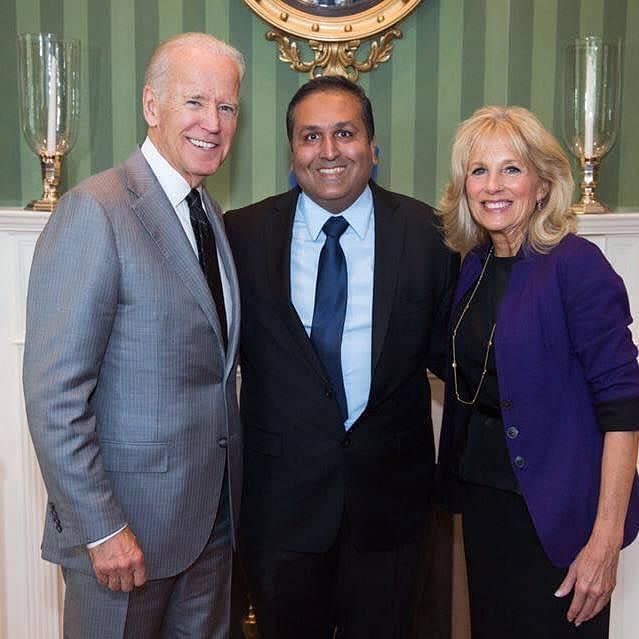
Among Vote-Converting Issues – India’s Security & Indo-US Ties
Campaigns have formed faith-based groups such as ‘Hindus for Biden’ and ‘Hindu Voices for Trump’, to target specific desi communities. Not restricting their outreach to swing states, both campaigns are also using desi networks in states which are not historically considered battlegrounds.
Along with language and culture, India’s security and Indo-US ties have become vote-converting issues.
‘Indian Voices for Trump’ is a 5000+ volunteer group carrying out outreach drives in many states, including largely Democratic leaning California. The state has the largest Indian American population in US. Satish Chandravale of the California chapter of ‘Indian Voices for Trump’ looks out for his home country in his volunteering, “US is my karmabhumi, but I should have respect for my matrabhumi. India has given me education and values. I need to pay back to my country,” Satish Chandravale said.
Volunteers for ‘Indian Voices for Trump’ and ‘US Impact’ are present at early voting centers in many states including Texas, which has the second largest Indian American population in US. At the forefront are home country attachment themes like Modi-Trump friendship and Trump keeps India safer from Chinese intrusions.
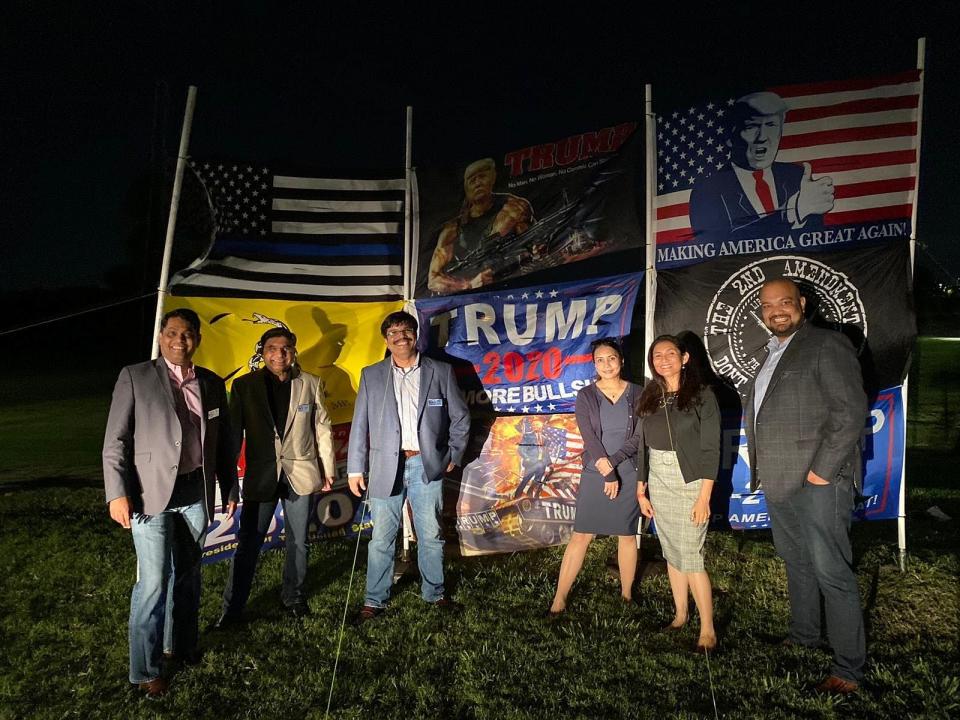
Desi Candidates Are Recognising Strength Of Desi Voter Mobilisation
According to a Khushboo Rawlley, a board member of ‘Indian Voices for Trump’, “Biden’s plan to bring Sharia for Muslims, and Harris’s stance on CAA and Kashmir, have influenced voters in Dallas.” She shares her success with an early voter, “A typical Indian housewife came to vote. She was unaware and confused. I told her about the USD 3 billion defence deal that President Trump has made with India, during a war like-situation with China. It felt great that I convinced her to vote for Trump.”

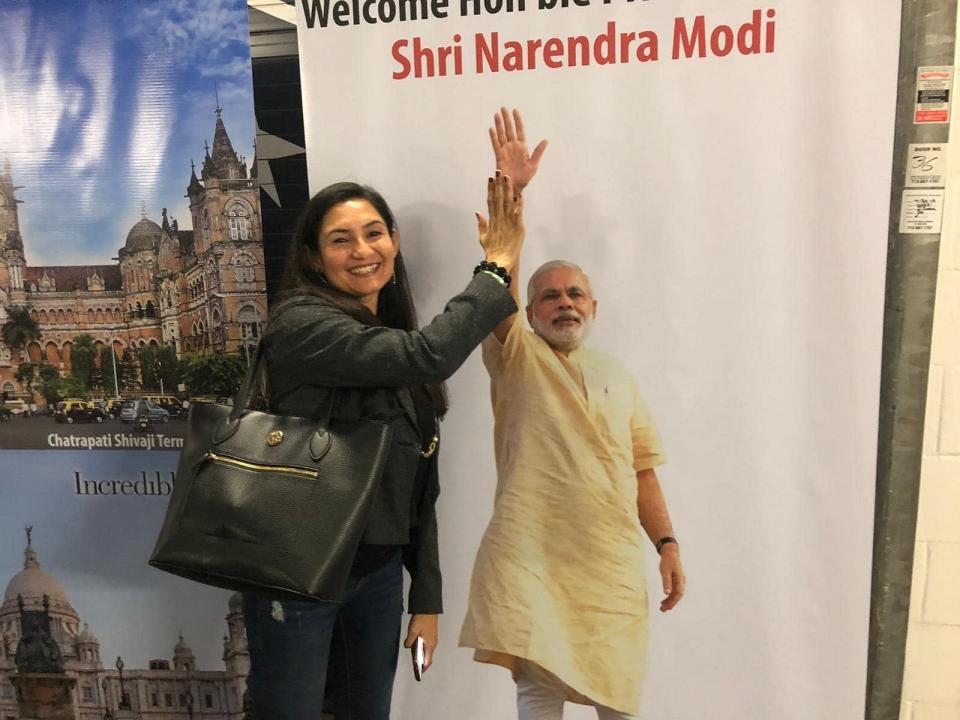
Desi candidates are also recognising the strength of the desi voter mobilisation.
Rik Mehta is running for US Senate from New Jersey against an established politician, Democrat Senator Cory Booker. Rik’s campaign would have ideally liked to meet desis during the festive season: “A lot of our events are cancelled. Navratras are a special time for our community. But digital consumption is at its highest. South Asian Republican groups are very active in getting the vote out. The Democrats might have out-raised us, but we will outperform them,” he told The Quint.
72-75% Desis May Choose Biden-Harris
With both campaigns courting desi voters like never before, Indian Americans are keeping their own count of where the vote is going. Sampat Shivangi, a member of the Trump Campaign’s Coalition Advisory Board, estimates that: “Trump has made inroads into Indian American votes, especially Gujaratis. 90 percent of Gujaratis will vote for Trump. Modi brought voters to Trump. If not 50-50, Trump should get 40 percent of votes compared to 22 percent in 2016.”
Shekhar Narsimhan of the AAPI Victory Fund’s number is, “75 percent Indian Americans will vote for Biden. The level of attention being paid to immigrant communities is highest ever. Lesson learnt from 2016 is to pay attention. The vote is trending in our direction, and the plan is to go ahead and solidify it.”
According to the Carnegie Endowment survey, 72 percent of Indian Americans are likely to vote for Biden and 22 percent intend to vote for Trump. If 72 percent of Indian Americans in swing states of Michigan, Wisconsin and Pennsylvania vote for Biden, it could prove to be consequential.
(Savita Patel is a senior journalist and producer, who produced ‘Worldview India’, a weekly international affairs show, and produced ‘Across Seven Seas’, a diaspora show, both with World Report, aired on DD. She has also covered stories for Voice of America TV from California. She’s currently based in the San Francisco Bay Area. This is an opinion piece, and the views expressed are the author’s own. The Quint neither endorses nor is responsible for them.)
. Read more on Opinion by The Quint.Sunday View: The Best Weekend Opinion Reads, Curated Just For YouHow Desi Americans Are Using Their Own ‘Bhasha’ To Woo Voters . Read more on Opinion by The Quint.

